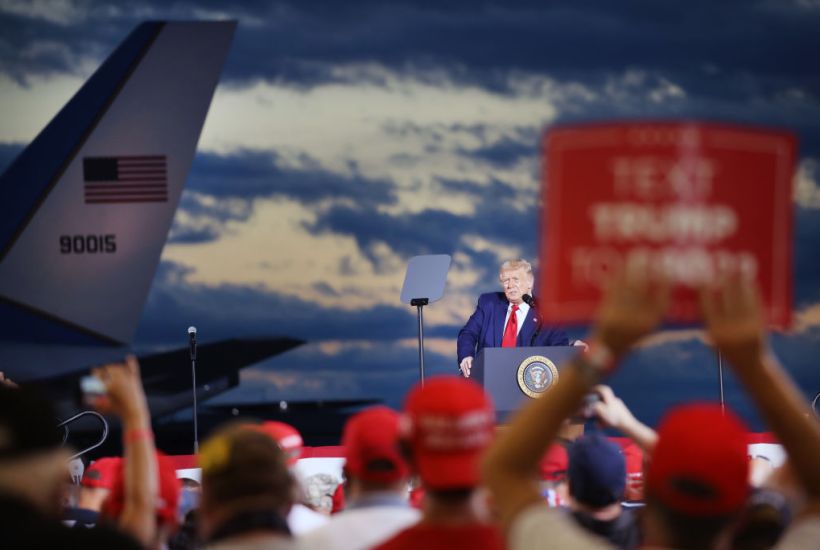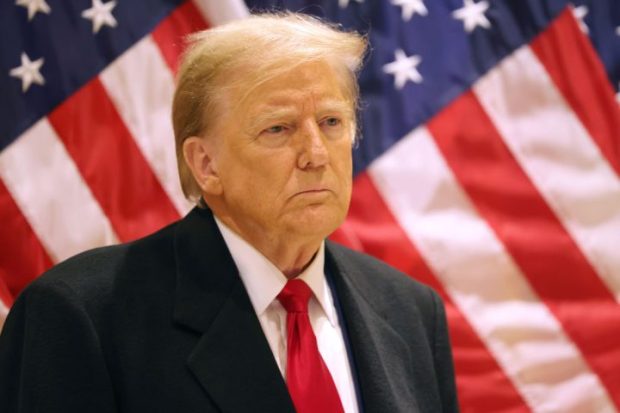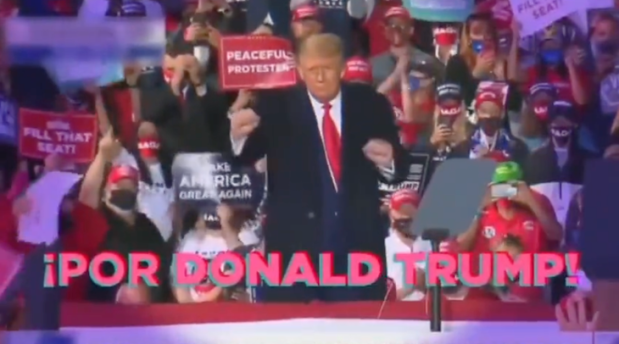You can tell something about a campaign by the desperation-levels of its fundraising emails. In recent weeks, Team Trump’s digital team has started to resemble a company on the verge of bankruptcy. My inbox is full of emails purporting to be from various members of the Trump family, telling ME in CAPITAL LETTERS how important it is that STEP UP and PAY THEM.
Yesterday, for instance, Kimberly Guilfoyle tried to guilt-trip me by saying that she had been ‘recently reviewing the donor files of the President’s long-time supporters and I noticed that yours was EMPTY.’
Hours earlier, I was informed that a ‘PERSONALIZED’ Trump Platinum Card was waiting for me, and it was my LAST CHANCE to take it. On Sunday Lara Trump told me that the President wants to do something special and send me a PERSONALIZED copy of one of his favourite pictures of himself. I’m also told on a daily basis that the Commander-in-Chief is ‘disappointed’ that my name is MISSING from various 2020 fundraising wheezes. ‘I don’t want the President to think he’s lost your support during the most critical time in our nation’s history.’ Sorry Newt.
‘Every great cause,’ said Eric Hoffer, ‘begins as a movement, becomes a business, and eventually degenerates into a racket.’ How right he was. And let’s be clear – this sort of heavy email grifting is far from unique to the Trump campaign. But the late intensity of Team Trump’s efforts is perhaps explained by the New York Times’s big scoop as to the campaign’s sudden money concerns.
We had thought that the Trump campaign was flush with cash, following its decision to start its re-election campaign the day of his inauguration. For years, GOP insiders have been whispering excitedly about the oodles of cash in their 2020 coffers. Under former campaign manager Brad Parscale, we were told, the campaign machine had caught up and even overtaken the Democrats’ digital reach.
But presidential campaigns are very expensive to run. The longer they go on, the more they cost. It seems Trump 2020 spent enormous sums of money, some $800 million (£614m), while voters weren’t really paying attention to the election. It’s now coming up to November and the campaign is sending out desperate mailers. How did this situation happen? It can’t be just Parscale. How did the party of the right, which is supposed to be ethical and upstanding, find itself turning into a frantic fundraising racket in 2020?
It seems the knives have been out for Parscale, left and right, since the NeverTrumpist (and itself suspiciously well-funded) Lincoln Project pushed out a vicious attack ad on him, accusing Brad of living a playboy lifestyle as a campaign manager. He was demoted soon after and now Bill Stepien, the new campaign head, is also sending out begging Trump Victory emails, saying he needs MY money. Parscale now stands accused of spending ‘like a drunken sailor’. In his defence, Brad says that his spending decisions were taken with Ronna McDaniel, the GOP chairwoman, and ‘under the very close eye’ of the Trump family.
All of which leads to another question. How much is Trump himself spending on his re-election efforts? It would be highly unusual for an incumbent president to use his own fortune to fund his campaign, but given that Trump’s campaign is adamant that America will be destroyed by the radical left if the President doesn’t win again, surely Trump should be reaching more into his own pocket.
Team Trump emails to me insist that any contribution will be boosted by a ‘700 per cent match’, so a $5 (£3.80) gift will become a $45 (£34) one. From the language, it is unclear whether it is Trump himself is matching the money, which suggests he probably he isn’t, but then who – or what – is? According to Bloomberg news, Trump is apparently mulling whether or not to spend $100 million (£76m) on his own this year; he reportedly contributed $65 million to his 2016 campaign. It’s funny to think that Michael Bloomberg spent $1 billion (£767m) on his spectacular crash-and-burn effort earlier this year.
Perhaps the bigger lesson of all these campaign finance stories is that, in the digital age, campaign spend doesn’t automatically translate into political success in the way that it did in the decades when television was the dominant medium. So every campaign degenerates into a racket.
Got something to add? Join the discussion and comment below.
Get 10 issues for just $10
Subscribe to The Spectator Australia today for the next 10 magazine issues, plus full online access, for just $10.





















Comments
Don't miss out
Join the conversation with other Spectator Australia readers. Subscribe to leave a comment.
SUBSCRIBEAlready a subscriber? Log in